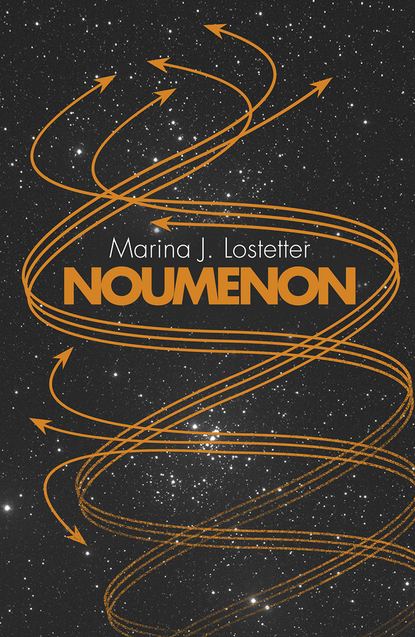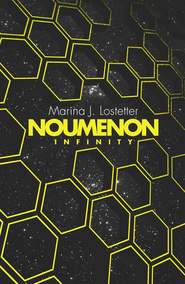По всем вопросам обращайтесь на: info@litportal.ru
(©) 2003-2024.
✖
Noumenon
Настройки чтения
Размер шрифта
Высота строк
Поля
“No, the idea.”
McCloud scoffed and pulled the glass from Reggie’s fingers. “If it’s within the realm of the possible, it’s not silly.”
“A construct larger—and perhaps more massive—than a star?” Reggie said. “Built by whom? All those billions of life forms we’ve taken note of out there?” The sarcasm was heavy, almost condescending, and he wished he’d dialed it back as soon as he spoke.
“Just because you can’t see it doesn’t mean it isn’t there.”
“Wasn’t that Dr. Countmen’s argument?”
“Look,” the professor said, “it got the crowd talking, didn’t it?”
“Your proposal is the only one that postulates the possibility of meeting intelligent life, or finding evidence thereof,” C chimed in. Reggie’s phone sat on the table between the two men. “Its uniqueness is statistically likely to make it more appealing.”
He had wanted interesting, he’d wanted sexy. And what was sexier, a bunch of rocks or an enormous alien machine?
“But, it’s just so unlikely,” Reggie said. “So unlikely that—”
“That what?” McCloud asked.
“That it feels like a lie.”
The waitress sauntered up, quickly exchanging his barren glass for one of plenty. She gave them both a sweet smile, one Reggie tried to return. Instead of thankfulness, though, he was sure his expression signaled mild indigestion.
McCloud started to speak, then paused to cough into his handkerchief. He wiped his mouth and nose, then tucked the square back in his pocket. “If I told you your research could either end up earning you a minor teaching position, or the Nobel Prize for physics, would I be lying?”
Reggie sighed and took a drink. “I’m not going to win a Nobel Prize.”
“But it is a possibility, no matter how remote. My suggestion that it might happen, whatever the odds, is no lie. That’s very different than saying I believe it will happen if I don’t.”
Reggie pouted. “You don’t believe my research is worthy of a Nobel?” He felt ridiculously petulant even as he said it and took another drink to hide his embarrassment.
“Did I say that?” He slugged Reggie in the shoulder and they shared a laugh. Professor McCloud finished off his whiskey. “So, if you don’t believe it to be an alien machine, what do you believe?”
“I don’t know. That’s why I want them to go find out—find the truth.”
“You want them to go, or you want you to go?”
An internal shudder ran through Reggie’s nervous system. McCloud had just hit on an idea Reggie hadn’t even let himself contemplate—a secret desire he hadn’t dared to hope for. He shook his head. “That’s impossible. Not worth thinking about.”
“Weren’t we just talking about possible/impossible? You could go. No one says you can’t. They haven’t decided on how to crew the ships. Haven’t decided who they need to man the warp-drives or whatever.”
“SD drives,” Reggie corrected. “It’s subdimensional travel.” Subdimensions, ha! It was a mangled term if he’d ever heard one. Almost as bad as calling something “dark” when it was simply unknown.
That was why the missions were being put together now. Deep space travel was finally a reality, the world’s political climate was in an upswing, armed conflict was at an all-time low, resources were abundant and more evenly dispersed than ever before, population growth had leveled out at nine billion (some scientists projected a possible decrease in the next fifty years), and humanity intended its first steps beyond its own solar system to be grand.
Humans were finally ready to see if they could survive out there, beyond the warm embrace of their little G-type star.
“I would never make it,” Reggie said. “It’s too far. You know how long it would take to get to LQ Pyx. Generations.”
“That doesn’t mean you couldn’t go along for the ride. Get things started in the right direction.”
“But it does mean I’ll never know.” He pushed his ale away. “I’ll never know why LQ Pyx is the way it is, one way or the other.”
“So, you’re a glass-half-empty man?” McCloud tapped his fingertips against the beer glass.
Reggie shrugged. “Maybe I am.”
“Here’s something I think glass-half-empty people always fail to consider.” He paused.
Reggie pursed his lips and raised an eyebrow. “What?”
With a flick of his wrist, McCloud had the beer in his hand. In the next moment he poured it down Reggie’s front.
“Ah!” Reggie sprang up, trying to jump away from the liquid that had already soaked through to his skin. “What the hell?”
McCloud laughed. “It’s not the empty that leaves an impression, is it?” He offered Reggie his handkerchief, but Reggie declined—he knew where it had been. Instead he held his shirt out from his chest, glancing around for help, but none was coming. McCloud continued. “Life’s not about missed opportunities, Mr. Straifer. It’s about the moments that drench us to the bone and leave us sopping with experience.” He pointed to the back of the pub. “Restroom’s that way, I believe.”
“There are three dry cleaners in this sector of town,” chimed C.
McCloud was crazy.
But that didn’t mean he was wrong.
In the months of waiting that followed, after he and the professor had returned to the States, Reggie spent a long time contemplating soggy Dockers as a metaphor for life. But he was a scientist, not a poet. Math was his thing—he’d never had much use for metaphors.
He got the gist, though.
Reggie was precariously balanced on a wobbly footstool, hanging his recently framed doctoral certificate, when his phone rang. He answered using his implants. When he heard who was on the other end, and why they were calling, he dropped the diploma. Glass shattered. The fragments formed a distinct blast pattern out across his wood-laminate flooring.
“They awarded me what? My proposal … my project? Are you sure? There’s no mistake? Yes, yes, that’s me. Oh my god. I can’t—I mean, thank you. Thank you!”
After twenty-four weeks, the panel—composed of thousands of professionals from nearly one hundred nations—had voted. Another week and the votes were tallied. The top twelve proposals, one to match each of the twelve convoys, had been chosen.
And his had claimed a spot. They were going to his star.
They were going to LQ Pyx.
Without picking up the glass he dashed for the coat closet and pulled out his jacket. Two more steps brought him to his apartment door, and he was already on the phone before it latched shut behind him.
It was time for a party. The kind of party he hadn’t thrown since his undergraduate days.
“C, send a message to the troops: we’re going in!”
Even PhDs know how to get good and snockered.
“Come on. Come on, it’s fun.” Reggie entwined his fingers with a young woman’s as he led her out into the night. With his free hand he toyed with the neck of his beer bottle, and his feet took stumbling, giddy steps through the grass. Behind them the party continued to roar.
One of Reggie’s friends, Miguel, rented a house in the hills not far from campus, and Miguel had agreed to host the shindig. “It’s like your coming-out party,” he said, slapping Reggie on the back. “You know, like they have in the south when girls get their periods.”






